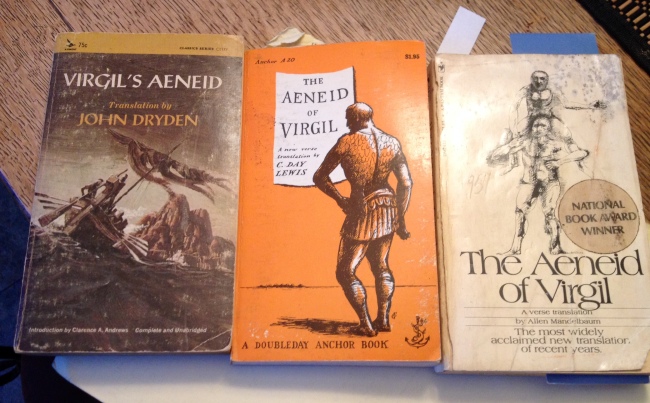I was looking for a particular book in my basement last night (I found it!). During the search, I came across the three different translations of Virgil’s Aeneid pictured above. All three books have interesting introductions about the art and techniques of translations, and the translator’s goals for his translation. All are very interesting, and all the translations are very different.
That got me thinking about what goes into making a translation that is most “true” to the original and how that is best accomplished. But before I get into that, let me offer the opening lines from these three very different translations of the Aeneid, in order of publication:
John Dryden, 1697:
“Arms, and the man I sing, who, forc’d by fate, / And haughty Juno’s unrelenting hate, / Expell’d and exil’d, left the Trojan shore. / Long labors, both by sea and land, he bore / And in the doubtful war, before he won / The Latian realm, and built the destined town;”
C. Day Lewis, 1953:
“I tell about war and the hero who first from Troy’s frontier, / Displaced by destiny, came to the Lavinian shores, / To Italy — a man much travailed on sea and land / By the powers above, becasue of the brooding anger of Juno / Suffering much in war until he could found a city / And march his gods into Latium….”
Allen Mandelbaum, 1972:
“I sing of arms and of a man: his fate / had made him fugitive; he was the first / to journey from the coasts of Troy as far / as Italy and the Lavinian shores. / Across the lands and waters he was battered / beneath the violence of High Ones, for / the savage Juno’s unforgetting anger; / and many sufferings were his in war — / until he brought a city into being / and carried in his gods to Latium;”
So, they all convey the same basic ideas and “facts” (you can see that for yourself), but each of these writers is working in his own tradition and style and each is making very different word choices. Both Dryden and Mandelbaum “sing” of arms and a man; Lewis “tells” about war and a hero. Dryden talks about Juno’s “unrelenting hate,” Lewis about her “brooding anger,” Mandelbaum about her “unforgetting anger.” Dryden talks about Aeneas’s “long labors,” Lewis about his being “much travailed,” and Mandelbaum about his being “battered” and undergoing “many sufferings.” Dryden and Mandelbaum both talk about “fate,” Lewis about “destiny.” And you can easily see many others for yourself, even in these few lines.
So, which is the most accurate? Which is the truest to the original? I have no idea, and at this point in my life, it’s highly unlikely that I’m going to read the Aeneid in Latin. So I, and I guess most of us, are stuck with translators if we want to read something, even a modern novel or a non-fiction book, written in a language we don’t know.
So we need to be wary of the translations we’re reading and I think we ought to wonder how “faithful” the translator is being to the original. How committed is he or she to the literal meaning of the original author’s words? How committed is the translator to the author’s tone and style? When the author is highfalutin, will the translator be highfalutin too? If the author uses the vernacular, or even gets vulgar, will the translator be vulgar too, or will he/she be tempted to “clean up” the author’s language?
My German is pretty good, and I’ve read some of Rilke’s “Sonnets to Orpheus” in the original and in translation. Most of the translations I’ve seen are pretty good, but even the best ones sometimes take liberties (in my opinion) to try to preserve a rhyme, or maybe they mess with the word order in significant ways. Does this serve the translation best? i’m not sure, but thinking about these questions reminds me of what Vladimir Nabokov (one of my favorite novelists) wrote about translation.
In his foreword or introduction to his translation of Eugene Onegin, VN talked about his philosophy of translation. I don’t have total recall of what he said, but if my memory is correct, he was totally against trying to preserve rhymes or to versify when translating a poem from one language to another. My best recollection is that he (VN) would simply try to put the most correct word in the most correct place, and not worry about rhyme or meter or line length or any of that stuff.
Maybe that’s the best way to do it. You’re probably most likely to get the author’s original meaning in that way. But it does strike me that you also run the risk of losing the cadence and style and “poetry” of the original if you follow that path.

